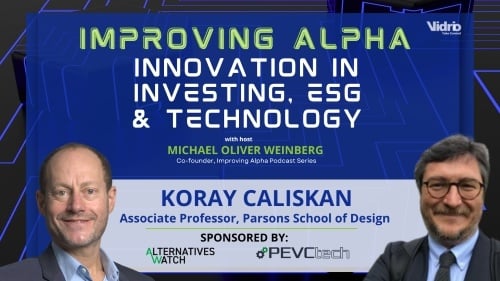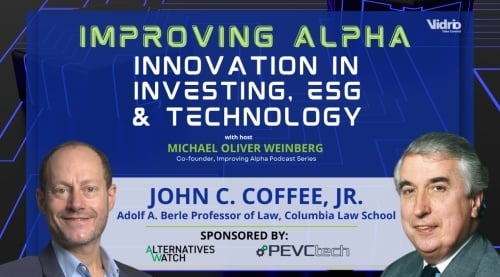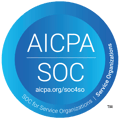Season two of the Improving Alpha podcast featured many diverse perspectives and innovative approaches to asset allocation strategies. How do our guests spend their time reading and listening to other sources of inspiration to accelerate their careers? Find out in our latest Vidrio blog featuring the top book recommendations from guests of the Improving Alpha Podcast.
By: David Barry, Director of Marketing, Vidrio Financial
Dive into the second season of the Improving Alpha Podcast, where host Michael Oliver Weinberg, in collaboration with Vidrio Financial, brings you insightful conversations with leading experts from the institutional investor community.
Attendees featured representatives from CalSTRS, Drexel University, The Doctors Company, The Carson Family Trust, Salsano Group, along with professors and academic leaders from Columbia Business School. Each guest contributed his or her unique insights on:
- Asset allocation strategies – including hedge funds, private credit, venture capital, commodities, real assets, secondaries, private equity, infrastructure, fixed income.
- The total portfolio approach, a new variation of factor investing.
- Cutting-edge artificial intelligence methodologies and challenges.
- Red flags in institutional investing.
- Regulatory environment trends and challenges for investing.
- The continued significance of expanding transparency within the GP-LP relationship.
- Combining investment disciplines for improving searches for alpha, (i.e., venture capital and private equity).
- And more.
We invite you to listen to each of these episodes on a future morning/afternoon commute or as your schedule allows. During each episode, we ask our guests if they seek inspiration (or escape, for a time, from asset allocation) from a favorite book. Below, you'll find a curated countdown of the top book recommendations from guests of the Improving Alpha podcast's second season. Don't forget to check out the recommended book list from season one as well!
Scott Chan, Chief Investment Officer, CalSTRS:
CalSTRS manages over $340 billion in assets and requires sophisticated allocation strategies that integrate cost-savings, mitigate risk, and maximize returns. In this episode of the Improving Alpha podcast, we learned about their collaboration model and how Scott relies on this model to do more in co-investments and joint ventures.
Scott’s reading list is influenced by his long commute, so he has a full pipeline of interesting titles. However, the standout isn't a book but a podcast—BG2. This bi-weekly dialogue, featuring Brad Gerstner and Bill Gurley, explores the dynamic realms of technology, markets, investing, and capitalism. Among the captivating discussions Scott highlighted is the buzz around AI, unraveling the financial intricacies when major corporations partner with AI startups boasting high valuations and future cloud service plans. Dive deeper into these insights by tuning into the BG2 podcast here.
Shivram’s discussion on the Improving Alpha podcast centered around the challenges in corporate governance and where CEO’s go if they need a sounding board to improve their investment strategies. Similar to the Scott Chan discussion above, Shivaram’s Kindle library contains a full pipeline of pending reads and he also has a frequent playlist of podcasts, including Econ Talk with Russ Roberts, which boasts over 900 episodes and covers topics of the healthcare system, data challenges, and a whole lot more.
The book that Shivaram called out and has a huge ROI to him is The Bed of Procrustes, as he is constantly leveraging the aphorisms found inside this book across his classes at Columbia University.
Catherine Ulozas, Chief Investment Officer, Senior Vice President, Investment, Drexel University:
Catherine Ulozas from Drexel University captivated listeners on the Improving Alpha podcast with her innovative banker’s approach to asset protection, which has been instrumental in transforming Drexel University’s $650 million endowment into a billion-dollar asset under management. She advocates for a strategic dose of skepticism when evaluating portfolio dynamics. Its crucial to challenge the assumptions that shape your conclusions and model inputs, as these models inherently carry the biases of the investment team’s initial assumptions.
Two books that Catherine pointed to during her discussion with Michael that have influenced her travels as a leading CIO are:
One section of Quit by Annie Duke that Catherine highlights being critical to investment analysts is where the author goes into people who can’t let go of their thesis when all signs around them are instructing them to do so. This is critical in her business due to the reasons expressed above and in the Improving Podcast discussion with Michael.
History is another favorite category of Catherine’s to explore, pointing specifically at, To Rescue the Republic, which charts the time the United States came out of the Civil War. An overall lesson in triumph that all allocators could focus on when navigating inflation, geopolitical risks, and other alpha strategies.
TC Wilson, Chief Investment Officer and Senior Vice President, The Doctors Company:
Back in the 1970s, The Doctor’s Company emerged as an entirely new type of insurance carrier, led by doctors, with 450 members. Today that member number has grown to 90,000 strong and is on the mission to advance, protect, and reward the practice of good medicine, with around $7.3 billion in assets and $3bn in surplus.
For TC Wilson, CIO and Senior Vice President of The Doctors Company it’s all about balancing the investment side and the underwriting side of the business. When he takes a break from the financial world, TC immerses himself in literature beyond the company’s scope, often delving into the rich history of golf, instructional guides, and the chronicles of the US Open, all of which have notably enhanced his golf skills. Additionally, TC recommends Body by Science for those eager to transform their gym routines into efficient 10-15 minute high-intensity sessions. By integrating these strategies, TC not only feels rejuvenated post-workout but also maximizes his time, allowing him to pursue even greater investment opportunities.
In episode 21 of the Improving Alpha podcast, Christopher Wiggins delves into the intriguing concept of artificial intelligence 'scar tissue', which is the understanding needed to discern AI's missteps and correct them, while identifying what is precise and can be transformed into actionable insights. This conversation centered on the strategic exploration and exploitation of AI's potential, revealing where today's allocators can truly gain an edge.
Chris also shares two insightful books with listeners that further illuminate these themes of AI exploration and exploitation.
Algorithms to Live By showcases how precise algorithms used by computers can also answer human questions transforming the wisdom of computers into better strategies for human living.
How Data Happened, which is co-authored by Chris, takes the reader into how AI was born, conceptualized and eventually integrated into businesses in the form of data science roles and machine learning.
Olivier Toubia, Glaubinger Professor of Business Marketing Division, Columbia Business School:
Continuing in a similar path of AI exploration, we welcomed Olivier Toubia to the Improving Alpha podcast to discuss his research in this field, the dark side of AI, biases that exist in things like Chat GPT, and more. One might assume that like Chris, his book recommendations would follow either a data angle or larger AI case studies. This was not the case as Olivier prefers to side with humanity when choosing book options, taking a step away from AI. His two recommendations are below.
Living with Our Dead focuses on more humanist characteristics and lives that celebrate love, memory and the power of storytelling to inspire better lives in those that are still a part of our world.
Primo Levi, If This Is a Man – The Truce is another book that in Olivier’s opinion provides a humanist perspective on the world.
David Teten, Chairman, PEVCTech.com:
To provide more insight into the world of venture capital and what is on the horizon for alternative VC and the challenges that exist today, the Improving Alpha podcast invited David Teten from PEVCTech.com to the program. David shared his insights on the current lack of tools that support private markets, why he’s super excited about emerging VC funds, and how VC can improve alpha from their investing strategies. This episode is packed with invaluable insights for our dedicated allocators, promising a wealth of knowledge and inspiration.
Michael then shifted gears and asked David about his current book recommendations. Those books are below and present a good check-in around the debates that we’re having now on the necessary guardrails in AI, as well as being able to push your career ahead and take advantage of programs that are available to students while in college. A must-read resource for those starting in finance programs. David co-wrote the To University and Beyond.
Mazen Jabban, Chairman & CEO, Vidrio Financial:
Strategic technology decisions are crucial and should be guided by top management, as they signify a transformative shift demanding specialized expertise. In today's fast-paced institutional investment world, disruptive technologies can either propel companies to new heights or render them obsolete. AI holds the power to redefine success. As highlighted in Michael's conversation with Mazen, this book, The Innovators Dilemma, is an indispensable resource for those navigating the complexities of innovation, especially as more decision-makers grapple with their execution strategies.
The Innovators Dilemma is based on the idea that even great companies can fail to do everything correctly and provides entrepreneurs, managers, and CEOs with tips and warning signs on how to avoid business failures.
The episode featuring Russ Carson was a favorite of the 2024 series of the Improving Alpha podcast. During the discussion with Michael Oliver Weinberg, Russ highlighted his career, evolving from managing $5 million in Citibank’s VC arm to leading his firm managing $31 billion in AUM. Russ also went into his strategic views on making smaller acquisitions in the healthcare and information technology space that led to much larger successful businesses. When Michael asked about book recommendations, it seemed easy for him to highlight the two options below.
Russ commented that Musk can be thought of as the Thomas Edison of our generation creating multiple successful companies based on totally new technology.
Mitt Romney in Russ’s opinion, is the opposite of Elon and is also a very smart and successful person in his own right. The piece of advice that Russ provided to younger listeners of the Improving Alpha podcast was to also give some thought today to what you’re going to do when you become successful and what direction you will take with the wealth that you create.
Sandro Salsano, President of the Salsano Group:
Many institutional players can’t compete in a pricing war with larger sovereign wealth funds or private equity shops, so the alternative is to look for opportunities where targets are delivering free positive cash flow and have in a way been forgotten by the rest of the market investors. This is the deep value strategy that Sandro Salsano discussed with Michael on episode 14 of the Improving Alpha podcast, which has helped his team generate 30% IRR across the portfolio.
Thinking Fast and Slow, examines two systems of the brain one is fast which handles the intuitive and emotional actions of the mind, the other is slow which is more deliberative and logical. This is something we at Vidrio believe every allocator needs to understand in navigating alpha opportunities.
The other book that Sandro pointed to was The Wealth of Nations by Adam Smith. This book contains a lot of psychology that can be applied to investing to help balance both greed and fear while making us more aware of our inherent biases. Sandro went on to state that we are just humans after all and have emotions controlling the way we react, this impacts the risks that we take and our perspectives.
This list would not be complete without a book recommendation from our host, Michael. Two notable entries into this include:
Genghis Khan and the Making of the Modern World is a fascinating history of one of the world’s most influential, and under-appreciated people. The story, Khan’s accomplishments, and his impact on Europe, western culture and society today are largely under-appreciated. In addition, the human element is shockingly touching.
Superconvergence does a fabulous job explaining how the confluence of genetics, biotech and AI wil irrevocably transform humanity and civilization as we know it. Michael did state that he wasn’t t sure he agreed with all the solutions, its thought provoking and worth a read.
Be on the lookout for other Improving Alpha podcast top reads in the coming months as we invite more guests to share their thoughts on how they enhance their own knowledge and potentially escape into other worlds
*Note all book cover images were found via Amazon and can be purchased on the Amazon website.
























